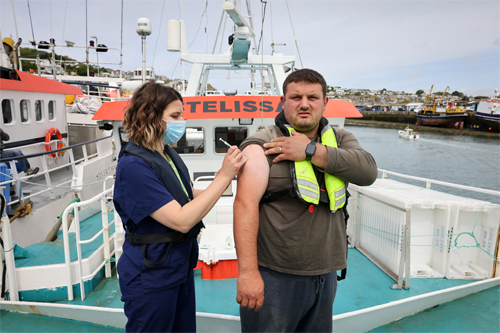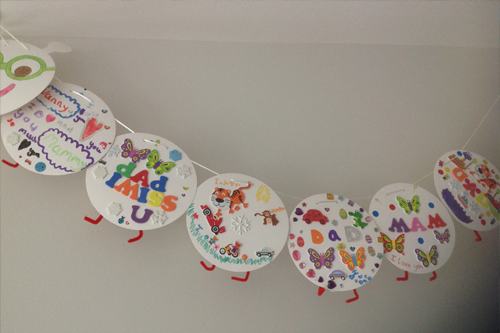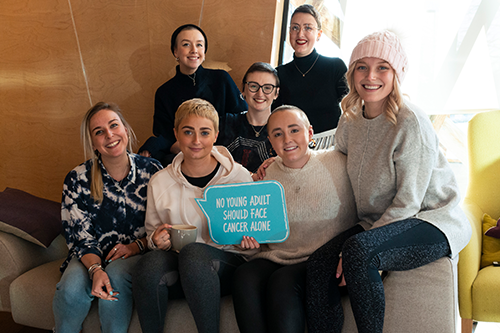Healthcare and Medical Research 2023 winners: The Fishermen’s Mission
Why they won
- Innovation: Identified an unmet need and created services to meet it, which were then adopted by the NHS.
- Partnership working: Collaborated with other organisations including the NHS to bring medical and dental services to those who aren’t able to easily access those services.
- Scalability: Grown from serving 655 people in 2018 to more than 2,000 a year now
- Co-production: Services were designed in consultation with those that would use them
Commercial fishing is one of the most dangerous occupations in the world, with UK fatality rates 100 times higher than the general workforce.
 Fishing industry workers, most of whom are men, work long, unpredictable hours due to their reliance on external factors like the weather and seasonal fish stocks to make a living. This inconsistent work-life balance can make booking and sticking to health and dental appointments difficult.
Fishing industry workers, most of whom are men, work long, unpredictable hours due to their reliance on external factors like the weather and seasonal fish stocks to make a living. This inconsistent work-life balance can make booking and sticking to health and dental appointments difficult.
The fishermen face specific occupational health issues, the most common being heart disease, high blood pressure and circulation problems, muscular or skeletal conditions, and poor hearing or deafness. They also have dreadful dental health as many go years without seeing a dentist.
To address these issues, the Royal National Mission to Deep Sea Fisherman, more commonly known as the Fishermen’s Mission, piloted a harbourside health project at three ports between 2016 and 2018. This delivered free health and wellbeing checks for fishermen, in partnership with local NHS and commissioned healthcare providers, directly on the quayside.
The success of the pilots led to the launch of the UK-wide SeaFit programme in July 2018, in partnership with the Seafarers Hospital Society. Checks and service provision includes diet and exercise, weight loss, smoking cessation, drug and alcohol reduction, physiotherapy, mental health support, diabetes checks, prostate checks, eye tests, dentistry and cancer screening.
By demonstrating the urgent need for the service and the impact it could have on its beneficiaries, the charity hoped to kickstart statutory interest in the model. This approach worked; some NHS trusts are now running their own events, bringing GPs, health and wellbeing coaches, physiotherapists, mental health practitioners and pharmacy technicians to the quayside, particularly in Cornwall, Devon, and Northumberland. There is also a UK-wide 24/7 mental health text service.
Within four years the project has grown from 665 engagements in 2019 to 2,356 in 2022. It has provided many fishermen with immediate assistance for undiagnosed and untreated health issues, including some urgent referrals for more serious cases.
At least five fishermen told the charity that the intervention they received saved their life.
The Fishermen’s Mission also supported the Covid-19 vaccine rollout by administering 1,908 vaccinations across 22 ports in England, Scotland and Northern Ireland.
The first-year costs per beneficiary were approximately £488, now they have fallen to £260. Trustees at the Fishermen’s Mission and the Seafarers Hospital Society have now committed to funding the SeaFit programme for at least five more years.
Awards judge Nicola Toyer said: “You can really see the impact it is having with the NHS now starting to set up centres at the dockside. So the gap that the charity identified is now being plugged by central services.”
Judge Chris Sherwood said the project was flexible and designed in direct response to what the men were saying in the industry – with particular needs identified around dental health and mental health support shining through. He added: “This is where charity is so important because it fills that gap of poorly met or unmet needs.”
CC Reg no. 232822
Highly Commended
St David’s Hospice Care
Coping with the death of a loved one can be difficult for anyone, but children and young people can be irreparably affected by the loss of a key adult in their life. Children left unsupported through bereavement have an increased likelihood of engaging in substance abuse, criminal behaviour, underachievement at school, and are at greater risk of depression. St David’s Hospice in Wales sought to address the issue by creating the Unicorn Project, which supports children and young people facing or dealing with the loss of a parent or other significant adult. Since the project began in 2009, it has supported 2,400 families. In 2021-22 alone it held 1,580 support sessions with children and young people.
Trekstock
Young women in their 20s or 30s who have gone through cancer treatment can experience early, medically-induced menopause as a result, yet there is little awareness or support for those affected. So Trekstock created a bespoke programme called Navigating Menopause to support them through the process. The charity provides free online programmes that aim to give young people the confidence to navigate their treatment options and manage their symptoms while joining a community of people experiencing similar symptoms. Navigating Menopause covers signs and symptoms, how to get help, non-medical and medical options, sex and relationships, exercise and nutrition, grief and loss, and mental health.


